Resident International Grant
COVID-19 and International Travel
The Academy reserves the right to modify or cancel the Resident International Travel Grant Program or specific grants made under this program based on COVID circumstances in particular cities, regions, or countries.
The AAD provides funding for 12 U.S. and Canadian upper level dermatology residents to participate in one of the following international electives:
Four- to six-week elective at Princess Marina Hospital in Gaborone, Botswana.
Four week elective at the University of KwaZulu-Natal in Durban, South Africa.
Four week elective at Dhulikhel Hospital - Kathmandu University Hospital in Dhulikhel, Nepal.
A four week elective at the Universidad Peruana Cayetano Heredia in Lima, Peru.
The grant gives residents an opportunity to learn about the care of tropical and HIV-related dermatologic conditions as well as how to practice routine dermatology with finite resources. Residents are expected to prepare lectures and presentations, develop a database of photos, submit teledermatology consults, and present reports of their activities to the Academy and their home programs.
Grant recipients receive a stipend for accommodations, board, and insurance. The Academy covers airfare to rotation sites.
Apply now
Now accepting applications for Resident International Grant only for January-June 2023 rotation in Botswana. Winners will be notified May 1, 2022.
Apply herePrincess Marina Hospital – Gaborone, Botswana
Senior residents are preferred. Offered for January – June rotations. Applications are open and grants will be awarded May 1.
Princess Marina Hospital (PMH) is a tertiary government public hospital, and is also the teaching hospital for the University of Botswana School of Medicine. It is located in Gaborone, the capital city and largest metropolitan center in Botswana. PMH is a major referral center for the country, and patients come from hours away to be seen. The dermatology clinic at PMH is well-established, and dermatology residents have been rotating in the clinic through the AAD program for > 10 years, with support from the Botswana-UPenn Partnership. The unique feature of this rotation is that residents have the hands-on opportunity to see patients and practice dermatology autonomously, with supervision of a local dermatologist and RIG directors. Residents have an active leadership role are able to stretch their skills and knowledge about HIV-related dermatology, tropical dermatology, and experience working within the local system. Residents also have an active role in the inpatient consult service, pathology slide review, and will travel to outreach sites for clinic one day per week.
University of KwaZulu-Natal – Durban, South Africa
Grants offered for rotations to occur July – December. Application deadline September 30 (subject to change).
Durban is coastal city located in the South African province of KwaZulu-Natal and known for its rich cultural and ethnic diversity. Residents will work within the dermatology department at the University of KwaZulu-Natal (UKZN), which provides the only tertiary level dermatology care in the province. Outpatient clinics and inpatients services are concentrated at King Edward VIII Hospital and Inkosi Albert Luthuli Central Hospital, but the department also provides outreach dermatology services to clinic locations throughout the province. This rotation will allow residents to observe and learn about HIV-related dermatology, tropical dermatology, and the practice of general dermatology from local experts in a well-established dermatology training program.
Dhulikhel Hospital - Kathmandu University Hospital
Grants offered for rotations to occur July – December. Application deadline September 30 (subject to change).
Dhulikhel Hospital- Kathmandu University Hospital is a teaching hospital for Kathmandu University situated in Dhulikhel, Nepal, a town of 14,000 people 30 km outside of Kathmandu known for its temperate climate and views of the Himalayas at 1500m elevation. Dhulikhel Hospital is dedicated to the mission of providing high-quality, cost-effective care to the Kavre district and beyond, with 20 community-based rural outreach health centers. Residents will rotate in the dermatology department, founded in 2004, which has a busy academic outpatient practice, inpatient consult service, as well as dermatology outreach site visits. Residents will observe and learn from local dermatologists and have the opportunity to gain exposure to a model of sustainable dermatologic care in a low resource setting and to learn about the management of tropical diseases endemic to the region, including leprosy and leishmaniasis. More information about the Nepal rotation.
Universidad Peruana Cayetano Heredia – Lima, Peru
Grants offered for rotations to occur July – December. Application deadline September 30 (subject to change).
Cayetano Heredia is a teaching hospital for Universidad Peruana Cayetano Heredia, located in Lima, the capital of Peru. Lima is a large, modern city with a temperate climate located on the Pacific coast with a rich history. The hospital and the adjacent Alexander von Humboldt Institute of Tropical Medicine are the national referral centers for infectious diseases and are well-established teaching centers for tropical medicine, including the annual 12-week Gorgas Course and the new 1-week course in tropical dermatology. Residents will observe and learn from local dermatologists and have the opportunity to rotate in the busy outpatient clinic and inpatient service. They will learn about the diagnosis and management of a wide variety of endemic tropical diseases from experts in the field, as well as learn about the practice of general dermatology in Peru.
For more information, contact RIGNAHS@aad.org.
The RIG program has two application cycles. For residents interested in Botswana, applications are accepted in the spring for rotations to occur January–June of the following year. For residents interested in South Africa, Nepal, or Peru, applications are accepted in the fall for rotations to occur July–December of the following year. Please check the website for updates on the exact timelines of grant applications and awards each year.
Recommendation from program director or department chair via the application platform. A separate letter is no longer needed.
A 300-word (or less) expression of interest that includes how you feel you will be able to contribute to the host site.
Detailed curriculum vitae (including volunteer experience).
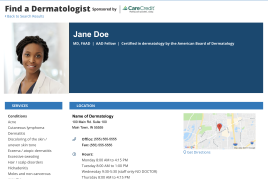 Make it easy for patients to find you.
Make it easy for patients to find you.
 Meet the new AAD
Meet the new AAD
 2022 AAD VMX
2022 AAD VMX
 AAD Learning Center
AAD Learning Center
 Need coding help?
Need coding help?
 Reduce burdens
Reduce burdens
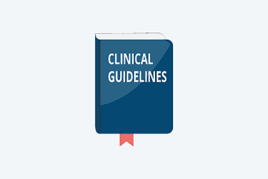 Clinical guidelines
Clinical guidelines
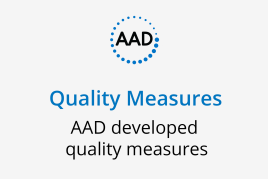 Why use AAD measures?
Why use AAD measures?
 Latest news
Latest news
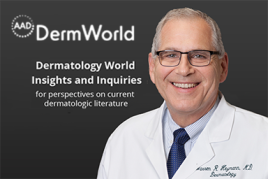 New insights
New insights
 Combat burnout
Combat burnout
 Joining or selling a practice?
Joining or selling a practice?
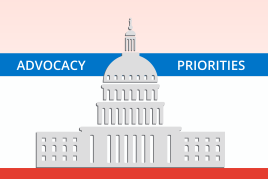 Advocacy priorities
Advocacy priorities
 Promote the specialty
Promote the specialty
